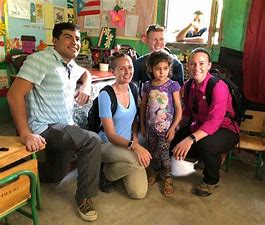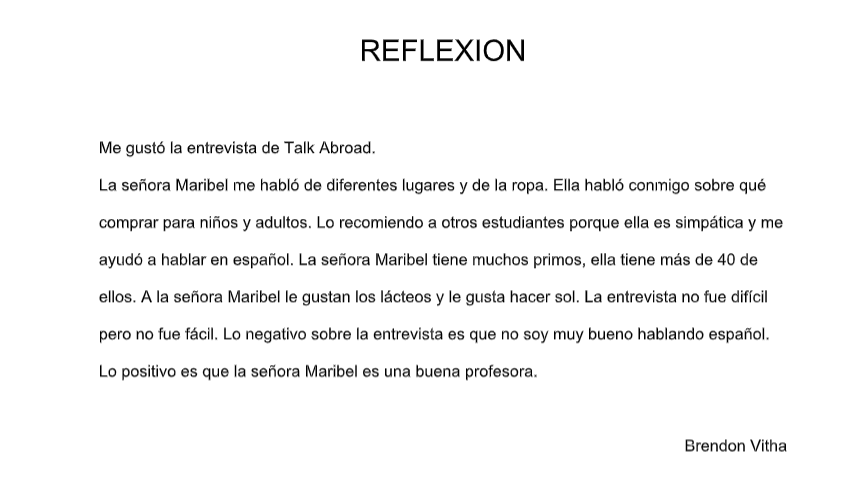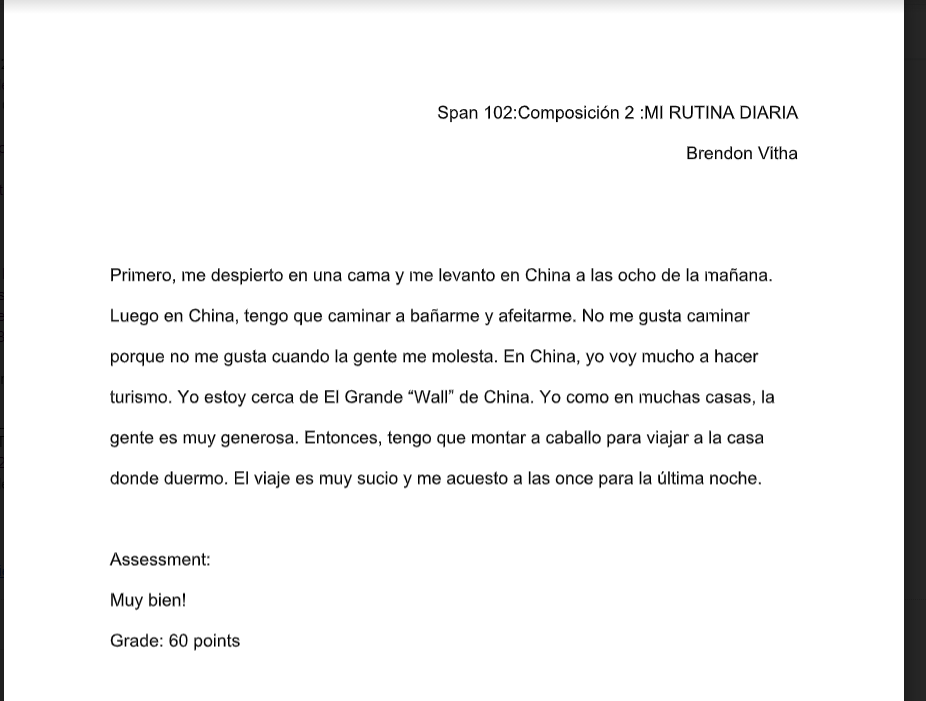Hello! My name is Brendon Vitha and I’m attending my second year here at Old Dominion University. I am 20 years of age and I have lived here in Virginia for the majority of my life. I am studying International Communications here at ODU and I’m in the Marine Corps NROTC, I am also minoring spanish and military leadership. I love to go to the beach, hangout with my friends, and to play soccer.
I have picked back up learning spanish from high school and I’m doing it now because I have had a resurgence of some type of drive due to my grandma knowing how to speak it fluently. She has helped me from time to time with understanding the differences between the cultures. It has definitely helped me see the world from another perspective and the challenge that learning another language has is completely unique compared to anything else. Throughout my second semester I have improved in all aspects. From struggling to form simple sentences to holding a conversation with a spanish teacher for 15 minutes on topics that I learned recently. Being patient and taking the time to learn the different vocabulary and grammatical accuracy has made me better at the language.

Exploring Culture
The Hispanic culture is vast and has many differences from country to country. It’s important to come into the world as an avid learner by trying to shred any form of predetermined stereotypes or judgments. The western culture as a whole has some glaring differences compared to the ones in the Hispanic world. The intimacy and closeness along with the friendliness are some key points when comparing the two cultures.

Engaging within the community
Engaging with those who surround you will allow you to be in a safer and happier place. Volunteering and simply helping out others makes the place where you stay a more positive one overall. Building relationships is what life is all about and there is no better way to do that than being engaged with the community which you reside. There is a sense of satisfaction that comes with doing good deeds and provides a heathy environment for the children who will eventually become adults.

Interpersonal Communication
My Talk Abroad experience was a positive one. Being able to practice and learn from another teacher allowed me to grow as a learner. I felt as if we could have spoke for even longer and that I was actually achieving growth when it came to speaking in Spanish. I believe that speaking is the most important part when it come to learning a new language. I am pleased with my performance and I look forward to the challenge it presents

Presentational Speaking
Starting off the year we did as a class some basic answering of questions from our homework. We preformed two dfferent talk abroad sessions and our final Oral presentation.
What I learned from the First Talk abroad to the second is the difference in preparation. I was not as prepared as I could have been, by either not setting up flashcards for myself or simply not studying as much I could. I did myself a disservice on the first one that I corrected to the second one. I was also not as confident or as comfortable in speaking compared to the second one, I would say nerves played a huge part too. I think I did well on my ability to think quickly and to understand what my talk abroad partner is asking, because you cant answer the question accurately if you don’t know what is being said.
Presentational Writing
We didn’t have too many assignments for presentational writing but we did have to write for homework throughout the weeks.

In this assignment we had to write about a fictional scenario about our daily routine but in an arbitrary location. This is my corrected version of the assignment and I would take away from it that I need to sharpen my grammar skills. I need to improve on all of my spanish skills but to make my writing more fluid and to have it be grammatically correct. It was challenging at first to think of a different routine that would be in a place that I would never need to visit, it was a fictional topic. I over came it by trying to make it comprehendible and have it be grammatically correct.
Interpretive Listening
Throughout the semester we as a class would listen to our professor so I would say that this is the skill that we practiced the most. From answering questions from her, or from my classmates or even from the VHL homework.
I’ve gotten better as the semester has gone on by being able to understand different types of dialects and their type of voice. Since everyone talks differently it helped a lot by having the Talk Abroad sessions. I met challenges by not knowing all the words when being spoken to so it felt like I was only receiving portions of sentences which can make it hard to comprehend what is being said. I felt as if I have overcome some of these challenges by practicing and by learning more words while expanding my spanish vocabulary.
Interpretive Reading
Reading spanish from the textbook for our class to the emails that the professor sends out is some practice that we’ve gotten throughout the semester. There are also some assignments that required us to read an excerpt to answer the questions.
From the start pf the semester to now spanish subtitles on when I watch Netflix or different types of movies/shows when I watch TV and surprisingly has helped a lot. Learning the language and how the sentences are formed grammatically has given me a different perspective than before. Some challenges that I’ve faced was similar if not the same to my challenges with listening. Knowing the vocabulary and the different types of diction throughout the sentences plays bigger part than I realized. Overcoming these difficulties has come by being around spanish more often as we come to a close with my second semester of spanish college classes. Practice really does help, who would have thought.